WASHINGTON, June 12, 2019 /PRNewswire/ -- The Community Oncology Alliance (COA) has developed an innovative and ambitious reform model to improve quality, reduce costs, and provide important additional cancer care services to patients. It is a detailed alternative payment model (APM) that includes bold proposals for value-based drug contracts that, if implemented, would provide high-quality, coordinated oncology care at the same or lower cost.
COA's model was recently submitted for review to the Physician-Focused Payment Model Technical Advisory Committee (PTAC), an advisory committee that evaluates physician-focused payment models for the Secretary of the Department of Health and Human Services (HHS). Titled "OCM 2.0," it is built upon the ongoing Center for Medicare & Medicaid Innovation (CMMI) Oncology Care Model (OCM). The model provides numerous enhancements to practices participating in the program and proposes concrete solutions to the issue of out-of-control cancer drug prices.
"This proposal reflects a commitment to helping build the cancer care system of the future that patients, providers, and payers all want," said Michael Diaz, MD, president of COA and a practicing medical oncologist at Florida Cancer Specialists & Research Institute. "We urgently request that the committee take the recommendations of community oncology practices who are on the frontlines of treating this devastating disease and help us transform cancer care for generations to come."
Nearly 200 oncology practices treating more than 150,000 Medicare beneficiaries signed on to the OCM when it was launched in spring 2016. While participating oncology practices have credited the OCM with helping them to improve the way they deliver cancer care, they have also criticized the program's complexities and burdensome reporting requirements.
As host to a peer-to-peer network of participating OCM practices and a leader representing independent, community-based cancer care, COA began exploring how to improve on the OCM. In developing OCM 2.0, COA has applied the lessons learned and used the feedback of participants in the OCM, as well as other APMs that have followed CMMI's lead.
COA's OCM 2.0 model features transparency and uniformity, an accreditation program to recognize and monitor exceptional cancer care, and a standard set of procedure and outcomes measures. It also seeks to address the unsustainable cost of cancer drugs and therapies by incorporate value-based insurance design principles that facilitate providing the correct care for each individual patient while sustaining disincentives for suboptimal care.
The OCM 2.0 model also proposes the government take the important step of providing waivers for drug manufacturers from various statutes and regulations that will reduce regulatory barriers and open the door for positive changes in drug pricing. CMMI has the latitude to address these obstacles to allow for value-based arrangements directly with providers, the stakeholder whose primary responsibility is patient care.
Initially targeted at the Medicare population, COA's OCM 2.0 proposal includes provisions for the universal adoption of the model in commercially insured populations. It was specifically developed to be a flexible and adaptable universal payment reform model for all aspects of cancer care, regardless of payer—Medicare, commercial insurance provider, or self-insured employer.
"This proposal is truly a universal, inclusive model for cancer care reform, designed so that any payer or practice can participate," said Bo Gamble, director of practice initiatives at COA. "It builds upon years of learning and observations from other reform initiatives with a goal of achieving high-quality, high-value cancer care for all patients."
With the publication of the OCM 2.0 model proposal, a three-week comment period begins. COA encourages all who have a stake in improving cancer care and reducing its cost to submit comments supporting the OCM 2.0 to the PTAC by July 1, 2019.
To read COA's full OCM 2.0 PTAC application, visit https://www.communityoncology.org/community-oncology-alliance-announces-ocm-2-0-proposal-an-ambitious-reform-model-to-improve-cancer-care-and-reduce-costs/
About the Community Oncology Alliance (COA): The majority of Americans battling cancer receive treatment in the community oncology setting. Keeping patients close to their homes, families, and support networks lessens the impact of this devastating disease. Community oncology practices do this while delivering high-quality, cutting-edge cancer care at a fraction of the cost of the hospital setting. The Community Oncology Alliance (COA) advocates for community oncology and smart public policy that ensures the community cancer care system remains healthy and able to provide all Americans with access to local, quality, affordable cancer care. Learn more at www.CommunityOncology.org.
SOURCE Community Oncology Alliance

Related Links
WANT YOUR COMPANY'S NEWS FEATURED ON PRNEWSWIRE.COM?
Newsrooms &
Influencers
Digital Media
Outlets
Journalists
Opted In




Share this article